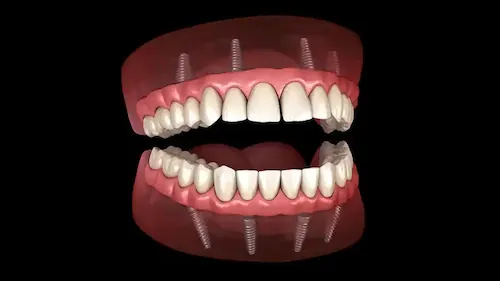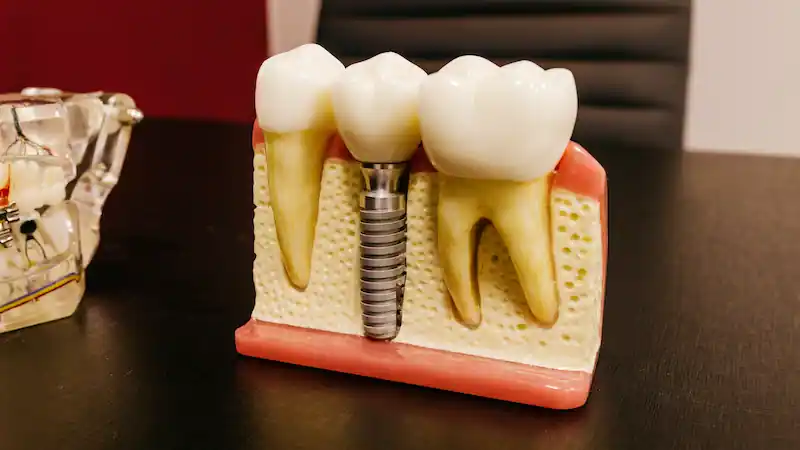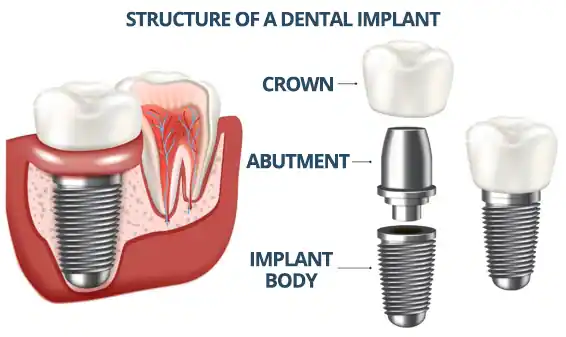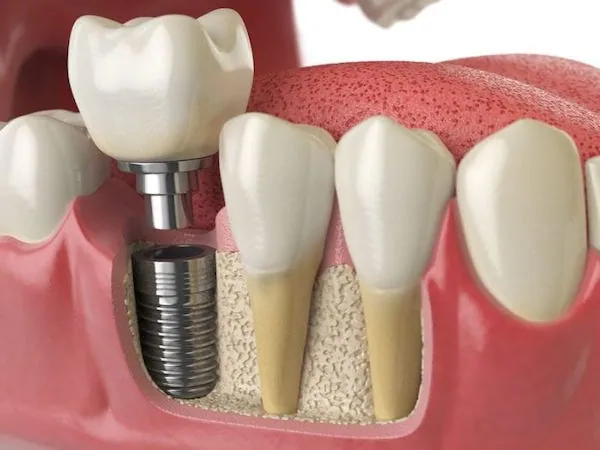What exactly are Dental Implants?
If you’re exploring options for replacing missing teeth, you might have wondered about dental implants and their suitability for you. Dental implants are artificial tooth roots that serve as a permanent foundation for fixed replacement teeth.
They have gained popularity as a long-term solution for individuals with missing teeth, failing teeth, or ongoing dental issues, surpassing dentures, bridges, and crowns. Dental implants are favored due to their ability to resemble, feel, and function like natural teeth, setting a new standard in tooth replacement.
So, what makes dental implants feel entirely comfortable and secure? Dentists utilize a titanium implant fixture that gradually bonds with the living bone cells of the jaw. This fusion creates a robust and durable anchor for your new teeth, eliminating concerns about slippage or movement, which can occur with dentures.
Dental implants also allow for hassle-free eating, as there are no restrictions, no need for frequent repairs, and no more worries about smiling confidently and openly.
Background
When a tooth is lost due to injury or disease, it can lead to various complications such as rapid bone loss, speech impairments, and discomfort while chewing. However, replacing the lost tooth with a dental implant offers a significant improvement in both the patient’s quality of life and overall health.
A dental implant system typically consists of the dental implant body and the dental implant abutment. Additionally, an abutment fixation screw may also be included.
The dental implant body is surgically inserted into the jawbone, serving as a replacement for the root of the missing tooth.
The dental implant abutment, usually connected to the implant body by an abutment fixation screw, extends through the gums into the mouth to provide support for the artificial teeth that are attached to it.
Dental implant components
Dental implants typically consist of three main components:
- The implant: This screw-like structure acts as an artificial tooth root, securely attaching to your jawbone for a permanent foundation.
- The abutment: It is a connector that is both permanent and removable by your dentist. The abutment provides support and holds a single tooth or a set of teeth in place.
- The crown (or prosthetic tooth): This is the visible part of the tooth replacement. Usually made of durable materials like zirconium or porcelain, the crown is designed to offer both strength and an aesthetically pleasing appearance.
Dental implants are versatile and can be used to replace a single tooth, multiple teeth, or even an entire upper or lower set of teeth. If you require a full arch restoration, you may be an ideal candidate for the full mouth teeth replacement treatment. In this procedure, four implants are placed, and a complete set of teeth is attached, earning its name as an “all teeth, only four implants” approach.
As dental implants have become the preferred choice for permanent teeth replacement, the Dental & Implant Centers Of Colorado approach has gained popularity as the preferred model for dental implant treatment.
Dental & Implant Centers Of Colorado provides a comprehensive solution with a team of experts working together under one roof. With an onsite lab fully equipped for the task, Dental & Implant Centers Of Colorado is dedicated to building beautiful smiles that cater to the specific needs of their patients.
One team, one cost, one location—this is the true advantage of choosing dental implants from Dental & Implant Centers Of Colorado.
Different Dental Implant Options for Various Needs
Full Mouth Dental Implants:
For patients seeking to replace an entire upper or lower set of teeth, full mouth implants provide a comprehensive solution. An oral surgeon will strategically place four implants and then attach a complete arch of teeth, giving this procedure its name. This approach offers a complete restoration for both functionality and aesthetics.

Multiple Dental Implants:
In cases where a patient is missing multiple teeth but still has healthy gums and surrounding teeth, multiple implants are an ideal choice. With this option, two fixtures are implanted, and crowns are attached, allowing the preservation of the natural teeth. It should be noted that the suitability of multiple implants varies for each individual, and in some cases, a full mouth or arch procedure may be preferred even if only a few teeth are missing.
Single-Tooth Dental Implants:
If you have lost a single tooth due to an accident or periodontal disease, a dental implant can effectively replace that tooth. The result is a replacement tooth that closely matches the appearance and functionality of your natural teeth. This option provides a seamless solution for restoring a single missing tooth.
Regardless of the specific dental implant option chosen, it is important to consult with a dental professional to determine the most suitable treatment plan based on individual circumstances and oral health.
Evaluation of Safety for Dental Implants
Ensuring the safety of dental implant systems involves rigorous evaluations based on international consensus standards and regulations. Here are the key ways dental implants are assessed for safety:
-
Compliance with Standards
Dental implant systems are designed and manufactured to adhere to the international consensus standards established by organizations like the International Organization for Standardization (ISO) or ASTM International. These standards outline the criteria for safe materials and manufacturing processes.
Most commonly used materials include titanium or zirconium oxide, which have well-known safety profiles. Occasionally, other materials such as gold alloys, cobalt-based alloys, titanium alloys, or ceramics may also be utilized.
-
Biocompatibility Testing
As part of the evaluation process, dental implant systems undergo comprehensive biocompatibility testing. This testing ensures that the materials used in the system do not cause complications such as irritation or allergic reactions when they come into contact with bodily tissues.
By demonstrating biocompatibility, the dental implant system can be deemed safe for implantation in individuals.
-
FDA Approval
In the United States, dental implant system manufacturers must seek approval from the Food and Drug Administration (FDA) before marketing their products. To obtain approval, manufacturers must provide evidence that their dental implant systems are as safe and effective as the ones already available in the market.
Through adherence to international standards, biocompatibility testing, and regulatory approvals, the safety of dental implant systems is thoroughly evaluated to ensure patient well-being and minimize any potential risks.
Patient Recommendations
When considering dental implants, it is crucial to consult with your dental provider to discuss potential benefits, risks, and whether you are a suitable candidate for the procedure.
Important points to consider:
- Overall Health: Your general health plays a vital role in determining your candidacy for dental implants, the duration of the healing process, and the long-term stability of the implant.
- Brand and Model: Inquire about the specific brand and model of the dental implant system being used and make a note of this information for your records.
- Smoking: It’s important to note that smoking can negatively impact the healing process and reduce the long-term success of the implant. If you smoke, discuss this with your dental provider for appropriate guidance.
- Healing Process: The healing process for the implant body may take several months or longer. During this time, a temporary abutment will typically be in place of the final tooth restoration.
After the Dental Implant Procedure:
- Oral Hygiene: Adhere to the oral hygiene instructions provided by your dental provider. Regular and thorough cleaning of the implant and surrounding teeth is crucial for the long-term success of the implant.
- Regular Dental Visits: Schedule regular visits with your dental provider for follow-up appointments and maintenance of your dental implants.
- Concerns or Discomfort: If you experience any looseness or pain around the implant area, it is important to promptly inform your dental provider.
Remember, open communication with your dental provider and diligent oral care are key to ensuring the success and longevity of your dental implant.
About Dental & Implant Centers Of Colorado
If you are struggling with dental issues and are searching for a satisfactory solution, dental implants offered at Dental & Implant Centers Of Colorado may be the right choice for you. In addition to the cosmetic benefits, dental implants provide significant health advantages.
Did you know that dental implants can help prevent bone loss in the jaw? When a tooth is lost, natural bone erosion begins, which can lead to the loss of other teeth and a “sunken” appearance in facial features. Dental implants integrate with the bone, providing stimulation that prevents deterioration of the jawbone. This helps maintain a more youthful facial structure, boosts self-confidence, and promotes better oral health.
Furthermore, dental implants can contribute to overall health improvement. With strong and fully functional teeth, patients can expand their diets and enjoy healthier foods like nuts and fruits.
Another crucial aspect to consider is the longevity of dental implants. With proper care, they can last a lifetime, making them an excellent long-term investment for tooth replacement.
In addition to these benefits, dental implants offer several other advantages. Unlike dentures, they do not slip or move, eliminating the need for special cleaners and adhesives. Unlike fixed bridgework, dental implants do not require healthy adjacent teeth to be filed down. Moreover, studies have shown a long-term success rate of over 95% for dental implants.*
To gain a better understanding of why dental implants are the ultimate solution for missing teeth, we invite you to visit us for a free consultation at Dental & Implant Centers Of Colorado. Schedule your consultation today and discover the remarkable results that our advanced dental technology and expert care can deliver.
*Note: The success rate may vary depending on individual circumstances and proper oral care.






